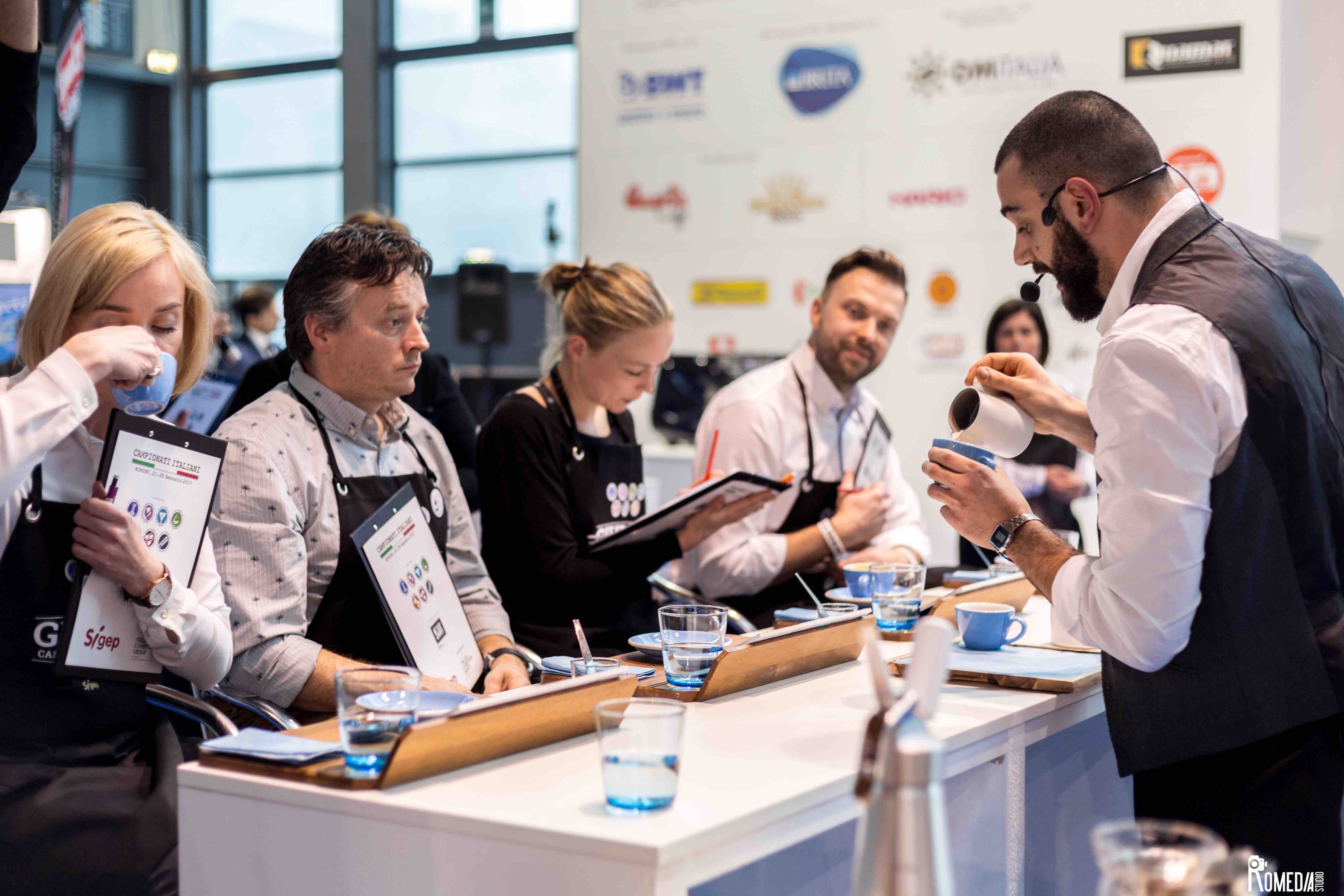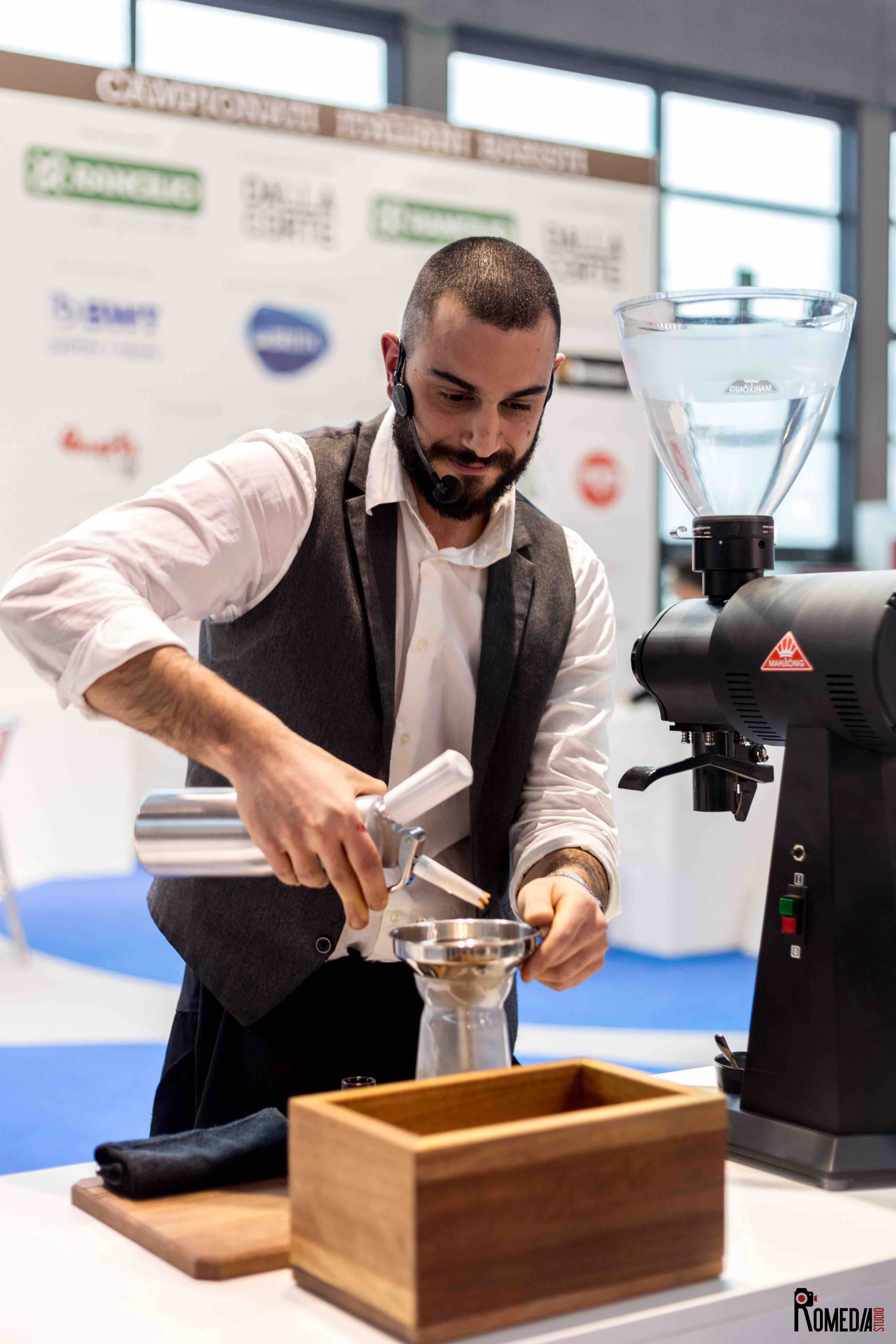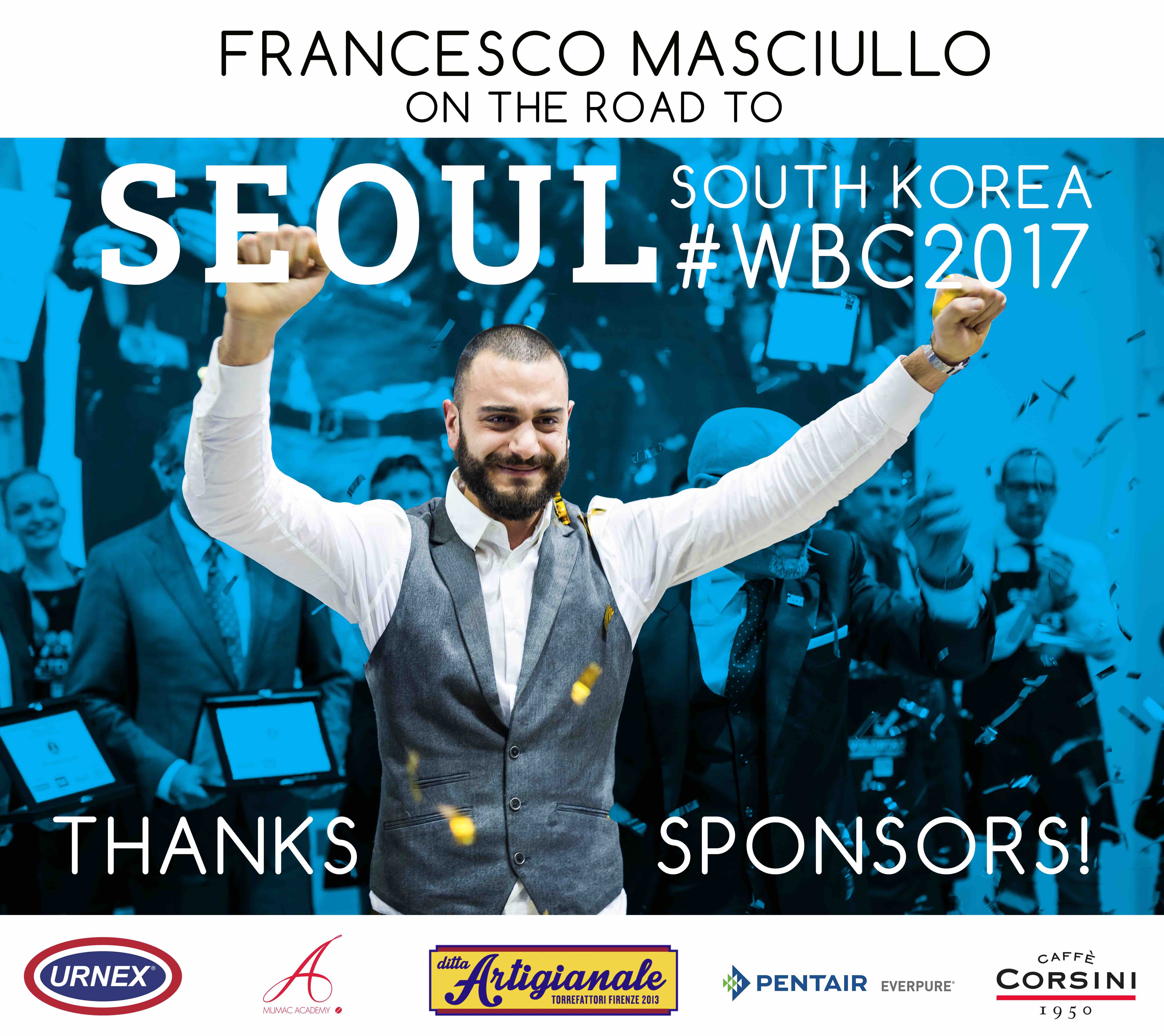FLORENCE, Italy – Francesco Masciullo, italian barista champion 2017 (he won the title last january at SIGEP Rimini) will fly to Seoul, South Korea, from the 9th to the 12th of November where he will represent Italy at the WBC – World Barista Championship, trying to get on the podium, which never happened before.
Masciullo, 26 years old, Salento-born but relocated in Florence, actually works as head barista at Ditta Artigianale, a brand of specialty coffeehouse, and has spent significant years of study abroad: he will challenge 63 champions coming from other countries, while preparing 4 espressos, 4 milk-based beverages and 4 coffee-based analcoholic drinks in 15 minutes (more information on https://worldbaristachampionship.org).
His team-mates will be coach Francesco Sanapo (who, in 2013, ranked in the sixth spot at WBC in Melbourne, the highest position ever achieved by Italy), Hidenori Izaki, japanese world champion in 2014, and Nikos Kanakaris, greece championship finalist. His competition is supported by Caffè Corsini, Ditta Artigianale, Mumac Academy, Urnex and Pentair.
For each and every beverage, Masciullo selected three different coffees: a Sidra Colombia coming from La Palma & El Tucan farm for the espresso, a Costa Rica El Diamante for the cappuccino and a Sl28 – coming from the same farm in Colombia – for the coffee drink.
All of these coffees were born out of an adaption (either to nature or men) and are trying to give to the coffee industry an answer to the global warming problem that threatens to cancel the second most drank beverage (after water) in the world. “We are training day and night for the world competition, we want everything to be perfect! – says Francesco Masciullo – my competition will revolve around the theme of global warming, a phenomenon that is enormously influencing the coffee world, that I already exposed during the italian championship in Rimini. This time though, I dug deeper into the matter, looking for coffes with exceptional tasting features which are the consequence of an adaptation to different climatic conditions and the research of men thanks, for example, to the studies of the World Coffee Rsearch to obtain eco-friendly products. I believe that each of us should start demanding coffees that are eco-friendly, before being biological, for example coffees that won’t require a big waste of water or fertilizing resources, that therefore won’t be the cause of a big deforestation and that, overall, won’t have an impact, or barely a minimum one, over the raise of global warming. And I believe that the coffee industry must adjust to this needs. If we don’t pay attention, in a time span of a few decades, coffee might not exist anymore. We baristas, since we have the chance to talk to customers everyday, must step up and demonstrate commitment to the cause, raising their awareness on the subject.”
“We are training day and night for the world competition, we want everything to be perfect! – says Francesco Masciullo – my competition will revolve around the theme of global warming, a phenomenon that is enormously influencing the coffee world, that I already exposed during the italian championship in Rimini. This time though, I dug deeper into the matter, looking for coffes with exceptional tasting features which are the consequence of an adaptation to different climatic conditions and the research of men thanks, for example, to the studies of the World Coffee Rsearch to obtain eco-friendly products. I believe that each of us should start demanding coffees that are eco-friendly, before being biological, for example coffees that won’t require a big waste of water or fertilizing resources, that therefore won’t be the cause of a big deforestation and that, overall, won’t have an impact, or barely a minimum one, over the raise of global warming. And I believe that the coffee industry must adjust to this needs. If we don’t pay attention, in a time span of a few decades, coffee might not exist anymore. We baristas, since we have the chance to talk to customers everyday, must step up and demonstrate commitment to the cause, raising their awareness on the subject.”
The Colombia El Diamante selected by Masciullo for the “milk beverage”, for example, grows at a reduced altitude and therefore doesn’t need a considerable altitude (which, often, implies deforestation and raise of carbon dioxide). “It’s a coffee that is synonimous with human adaption: even though it grows at low altitudes, it shows how it’s possible to obtain the right quality by experimenting with the processing techniques, which can generate their own sweetness. It’s an extremely high profile coffee, I chose El Diamante because I wanted, in the cup, the cinnamon aroma for the cappuccino as well.”
The colombian Sidra of El Tucan, thanks again to the research, shows different organoleptic properties compared to those of other types of coffee, with tropical fruity notes like peach and flowery ones like rose. “Sidra is a strain discovered in Ecuador: by bringing it to Colombia, i found the correct terroir to unlock and express at its best its very own organoleptic notes” concluded Masciullo. Regarding the analcoholic beverage, instead, the champion will use an Sl28 coming from Costa Rica: “it’s a coffee that offers different organoleptic features from those hailing from the origin contry of this strain, which is Kenya. Sl28 is a strain created in laboratory, which has been moved to Kenya to make it resistent to high temperatures. Brought in Colombia, it emanates different organoleptic features in this country, with a more balanced acidity, smells of red fruits and berries.” In the signature drink, Masciullo will glorifies the smells of this strain by using italian ingredients like raisin and a complex technique to obtain from a rose syrup the same features of the berries, adding a touch of black tea to balance the acidity.
Regarding the analcoholic beverage, instead, the champion will use an Sl28 coming from Costa Rica: “it’s a coffee that offers different organoleptic features from those hailing from the origin contry of this strain, which is Kenya. Sl28 is a strain created in laboratory, which has been moved to Kenya to make it resistent to high temperatures. Brought in Colombia, it emanates different organoleptic features in this country, with a more balanced acidity, smells of red fruits and berries.” In the signature drink, Masciullo will glorifies the smells of this strain by using italian ingredients like raisin and a complex technique to obtain from a rose syrup the same features of the berries, adding a touch of black tea to balance the acidity.
As soon as his studies ended in Salento, Francesco Masciullo attended a barista class with Sanapo – through Caffè Corsini – and from that moment his passion for the bean was born. Relocated in Florence, started working as a barista three years ago, after which he dediced to move to London to specialize himself into the specialty coffee field. After this experience, ho moved back to Florence on the occasion of the grand opening of Ditta Artigianale in 2014, to become part of the team Sanapo.















